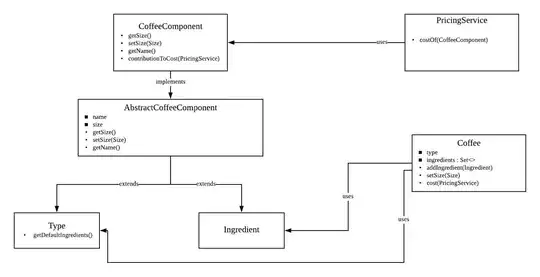In this case I have gone for some psuedo Composite pattern and the cost logic is altogether in a different class. Class diagram is as below :

So every thing that goes in Coffee is basically a CoffeeComponent hence the interface. It has three main methods getSize(), getName() and contributionToCost(). Note that contributionToCost() method takes a parameter PricingService, this is because the cost logic is with Pricing Service. AbstractCoffeeComponent is implementing the CoffeeComponent interface to provide common methods' implementation. From AbstractCoffeeComponent two classes are subclass : Type and Ingredient. So espress, mocha will refer to Type class and sugar, milk will be Ingredient instances. Idea is that PricingService has a lookup method which can give the cost on the basis of CoffeeComponent's name and size. Rest of the hierarchy is just to showcase how coffee concept can be coded. Below is the code for PricingService, Client and Coffee.
PricingService.java
package coffee;
import java.util.HashMap;
import java.util.Map;
import java.util.Objects;
/**
* Pricing ideally would be querying database for costs but here HashMap will do
*/
public class PricingService {
private static final class CostComponent {
private String componentName;
private Size componentSize;
public CostComponent(String name, Size size) {
this.componentName = name;
this.componentSize = size;
}
@Override
public boolean equals(Object o) {
if (this == o) return true;
if (o == null || getClass() != o.getClass()) return false;
CostComponent costComponent1 = (CostComponent) o;
return componentName.equalsIgnoreCase(costComponent1.componentName) &&
componentSize == costComponent1.componentSize;
}
@Override
public int hashCode() {
return Objects.hash(componentName, componentSize);
}
}
private final static Map<CostComponent, Double> costs = new HashMap<>();
static {
costs.put(new CostComponent("Espresso", Size.TALL), 10.0);
costs.put(new CostComponent("Rum", Size.TALL), 40.0);
}
public double costOf(CoffeeComponent component){
return costs.getOrDefault(new CostComponent(component.getName(), component.getSize()),0.0);
}
}
Coffee.java
package coffee;
import java.util.HashSet;
import java.util.Set;
/**
* Container class - because we want coffee
*/
public class Coffee {
private final Type type;
private Set<Ingredient> ingredients;
public Coffee(Type type) {
this.type = type;
this.ingredients = new HashSet<>();
this.ingredients.addAll(type.getDefaultIngredients());
}
public void addIngredient(Ingredient ingredient){
this.ingredients.add(ingredient);
}
/**
* Propagate size to all igredients and type
*/
public void setSize(Size size){
for(Ingredient ingredient: ingredients){
ingredient.setSize(size);
}
type.setSize(size);
}
/**
* Aggregate of all pieces for cost
*/
public double cost(PricingService pricingService){
double cost = 0.0;
for(Ingredient ingredient: ingredients){
cost+=ingredient.contributionToCost(pricingService);
}
cost+=type.contributionToCost(pricingService);
return cost;
}
}
Client.java
package coffee;
public class Client {
public static void main(String[] args) {
PricingService starbuzz = new PricingService();
//Order an Espresso
Coffee espresso = new Coffee(new Type("Espresso"));
/**
* Here new Type, new Ingredient is done, ideally this will also be some sort of lookup using Factory pattern
*/
//add sugar
espresso.addIngredient(new Ingredient("Sugar"));
//add rum :)
espresso.addIngredient(new Ingredient("Rum"));
//make it large
espresso.setSize(Size.TALL);
double cost = espresso.cost(starbuzz);
System.out.println("Cost : " + cost);
}
}
CoffeeComponent.java
package coffee;
public interface CoffeeComponent {
String getName();
void setSize(Size size);
/**
* Default lookup, implementations can override if wanted
*/
default double contributionToCost(PricingService pricingService){
return pricingService.costOf(this);
}
/**
* By default coffee is normal unless explicitly stated
*/
default Size getSize(){
return Size.NORMAL;
}
}
Ingredient.java
package coffee;
/**
* Sugar, milk, soy etc come here
*/
public class Ingredient extends AbstractCoffeeComponent {
public Ingredient(String name) {
super(name);
}
}
Type.java
package coffee;
import java.util.Collections;
import java.util.Set;
/**
* Espresso, Mocha etc types come here
*/
public class Type extends AbstractCoffeeComponent {
public Type(String name) {
super(name);
}
/**
* Default ingredients that come with this type
*/
public Set<Ingredient> getDefaultIngredients(){
return Collections.emptySet();
}
}
AbstractCoffeeComponent.java
package coffee;
public abstract class AbstractCoffeeComponent implements CoffeeComponent {
protected final String name;
protected Size size;
public AbstractCoffeeComponent(String name) {
this.name = name;
}
@Override
public String getName() {
return this.name;
}
@Override
public void setSize(Size size) {
this.size = size;
}
@Override
public Size getSize() {
return size;
}
}
As you can see if you need to add any more types, ingredients, size just add more rows in PricingService's Hashmap
Hope this helps. Although I agree with @bcperth that the example was to show pros and cons of Decorator pattern.
